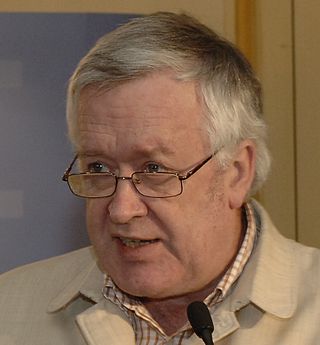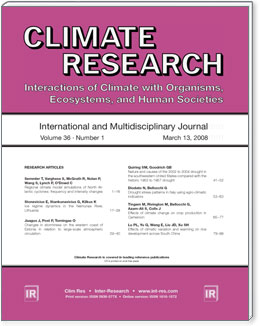
The temperature record of the last 2,000 years is reconstructed using data from climate proxy records in conjunction with the modern instrumental temperature record which only covers the last 170 years at a global scale. Large-scale reconstructions covering part or all of the 1st millennium and 2nd millennium have shown that recent temperatures are exceptional: the Intergovernmental Panel on Climate Change Fourth Assessment Report of 2007 concluded that "Average Northern Hemisphere temperatures during the second half of the 20th century were very likely higher than during any other 50-year period in the last 500 years and likely the highest in at least the past 1,300 years." The curve shown in graphs of these reconstructions is widely known as the hockey stick graph because of the sharp increase in temperatures during the last century. As of 2010 this broad pattern was supported by more than two dozen reconstructions, using various statistical methods and combinations of proxy records, with variations in how flat the pre-20th-century "shaft" appears. Sparseness of proxy records results in considerable uncertainty for earlier periods.

There is a strong scientific consensus that the Earth has been consistently warming since the start of the Industrial Revolution, and the rate of recent warming is largely unprecedented. This warming is mainly caused by the rapid increase in atmospheric carbon dioxide (CO2) since 1750 from human activities such as fossil fuel combustion, cement production, and land use changes such as deforestation, with a significant supporting role from the other greenhouse gases such as methane and nitrous oxide. This human role in climate change is now considered "unequivocal" and "incontrovertible".

Michael Evan Mann is an American climatologist and geophysicist. He is the director of the Center for Science, Sustainability & the Media at the University of Pennsylvania. Mann has contributed to the scientific understanding of historic climate change based on the temperature record of the past thousand years. He has pioneered techniques to find patterns in past climate change and to isolate climate signals from noisy data.

Hans von Storch is a German climate scientist. He is a professor at the Meteorological Institute of the University of Hamburg, and Director of the Institute for Coastal Research at the Helmholtz Research Centre in Geesthacht, Germany. He is a member of the advisory boards of the journal Journal of Climate. He worked at the Max Planck Institute for Meteorology from 1986 to 1995 and headed the Statistical Analysis and Modelling research group there.

Philip Douglas Jones is a former director of the Climatic Research Unit (CRU) and a professor in the School of Environmental Sciences at the University of East Anglia (UEA) from 1998, having begun his career at the unit in 1976. He retired from these positions at the end of 2016, and was replaced as CRU director by Tim Osborn. Jones then took up a position as a Professorial Fellow at the UEA from January 2017.

Hockey stick graphs present the global or hemispherical mean temperature record of the past 500 to 2000 years as shown by quantitative climate reconstructions based on climate proxy records. These reconstructions have consistently shown a slow long term cooling trend changing into relatively rapid warming in the 20th century, with the instrumental temperature record by 2000 exceeding earlier temperatures.
Downscaling is any procedure to infer high-resolution information from low-resolution variables. This technique is based on dynamical or statistical approaches commonly used in several disciplines, especially meteorology, climatology and remote sensing. The term downscaling usually refers to an increase in spatial resolution, but it is often also used for temporal resolution. This is not to be confused with image downscaling which is a process of reducing an image from a higher resolution to a lower resolution.
Jan Esper studied geography at the University of Bonn, where he later earned his doctorate. After a postdoc position at Columbia University in New York City, he continued his work on dendrochronology at the Swiss Federal Institute for Forest, Snow and Landscape Research (WSL), and qualified as a professor at the University of Bern. In 2018, Esper became a member of the Academy of Sciences and Literature. Since 2010, he has been a professor at the Department of Geography at Johannes Gutenberg University Mainz.

James Mark Court Delingpole is an English writer, journalist, and columnist who has written for a number of publications, including the Daily Mail, the Daily Express, The Times, The Daily Telegraph, and The Spectator. He is a former executive editor for Breitbart London, and has published several novels and four political books. He describes himself as a libertarian conservative. He has frequently published articles promoting climate change denial and expressing opposition to wind power.
The Climatic Research Unit email controversy began in November 2009 with the hacking of a server at the Climatic Research Unit (CRU) at the University of East Anglia (UEA) by an external attacker, copying thousands of emails and computer files to various internet locations several weeks before the Copenhagen Summit on climate change.

Climate Research is a peer-reviewed scientific journal published by the Inter-Research Science Center and best known to the general public for its 2003 publication of a controversial paper. The journal was established in 1990 and covers all aspects of the interactions of climate with organisms, ecosystems, and human societies. Its founder and long time publisher was marine biologist Otto Kinne.
The Soon and Baliunas controversy involved the publication in 2003 of a review study written by the aerospace engineer Willie Soon and astronomer Sallie Baliunas in the journal Climate Research. In the review, the authors expressed disagreement with the hockey stick graph and argued that historical temperature changes were related to solar variation rather than greenhouse gas emissions as was the position of the Intergovernmental Panel on Climate Change and other researchers. The publication was quickly taken up by the George W. Bush administration as a basis for amending the first Environmental Protection Agency's Report on the Environment.

Climatic Research Unit documents including thousands of e-mails and other computer files were stolen from a server at the Climatic Research Unit of the University of East Anglia in a hacking incident in November 2009. The documents were redistributed first through several blogs of global warming deniers, who alleged that the documents indicated misconduct by leading climate scientists. A series of investigations rejected these allegations, while concluding that CRU scientists should have been more open with distributing data and methods on request. Precisely six committees investigated the allegations and published reports, finding no evidence of fraud or scientific misconduct. The scientific consensus that global warming is occurring as a result of human activity remained unchanged by the end of the investigations.
Watts Up With That? (WUWT) is a blog promoting climate change denial that was created by Anthony Watts in 2006.
Andrew William Montford is a British writer and editor who is the owner of the Bishop Hill blog. He is the author of The Hockey Stick Illusion (2010).
The Wegman Report was prepared in 2006 by three statisticians led by Edward Wegman at the request of Rep. Joe Barton of the United States House Committee on Energy and Commerce to validate criticisms made by Stephen McIntyre and Ross McKitrick of reconstructions of the temperature record of the past 1000 years, in particular the reconstructions by Mann, Bradley and Hughes of what had been dubbed the hockey stick graph.
The North Report was a 2006 report evaluating reconstructions of the temperature record of the past two millennia, providing an overview of the state of the science and the implications for understanding of global warming. It was produced by a National Research Council committee, chaired by Gerald North, at the request of Representative Sherwood Boehlert as chairman of the U.S. House of Representatives Committee on Science.
Reiner Grundmann, is Professor of Science and Technology Studies (STS) at the University of Nottingham and Director of its interdisciplinary STS Research Priority Group. He is a German sociologist and political scientist who has resided in the UK since 1997. Previous appointments include Aston University and the Max Planck Institute for the Study of Societies.

Gabriele Clarissa Hegerl is a German climatologist. She is a professor of climate system science at the University of Edinburgh School of GeoSciences. Prior to 2007 she held research positions at Texas A&M University and at Duke University's Nicholas School of the Environment, during which time she was a co-ordinating lead author for the Intergovernmental Panel on Climate Change (IPCC) Fourth and Fifth Assessment Report.
The history of climate change policy and politics refers to the continuing history of political actions, policies, trends, controversies and activist efforts as they pertain to the issue of climate change. Climate change emerged as a political issue in the 1970s, where activist and formal efforts were taken to ensure environmental crises were addressed on a global scale. International policy regarding climate change has focused on cooperation and the establishment of international guidelines to address global warming. The United Nations Framework Convention on Climate Change (UNFCCC) is a largely accepted international agreement that has continuously developed to meet new challenges. Domestic policy on climate change has focused on both establishing internal measures to reduce greenhouse gas emissions and incorporating international guidelines into domestic law.










